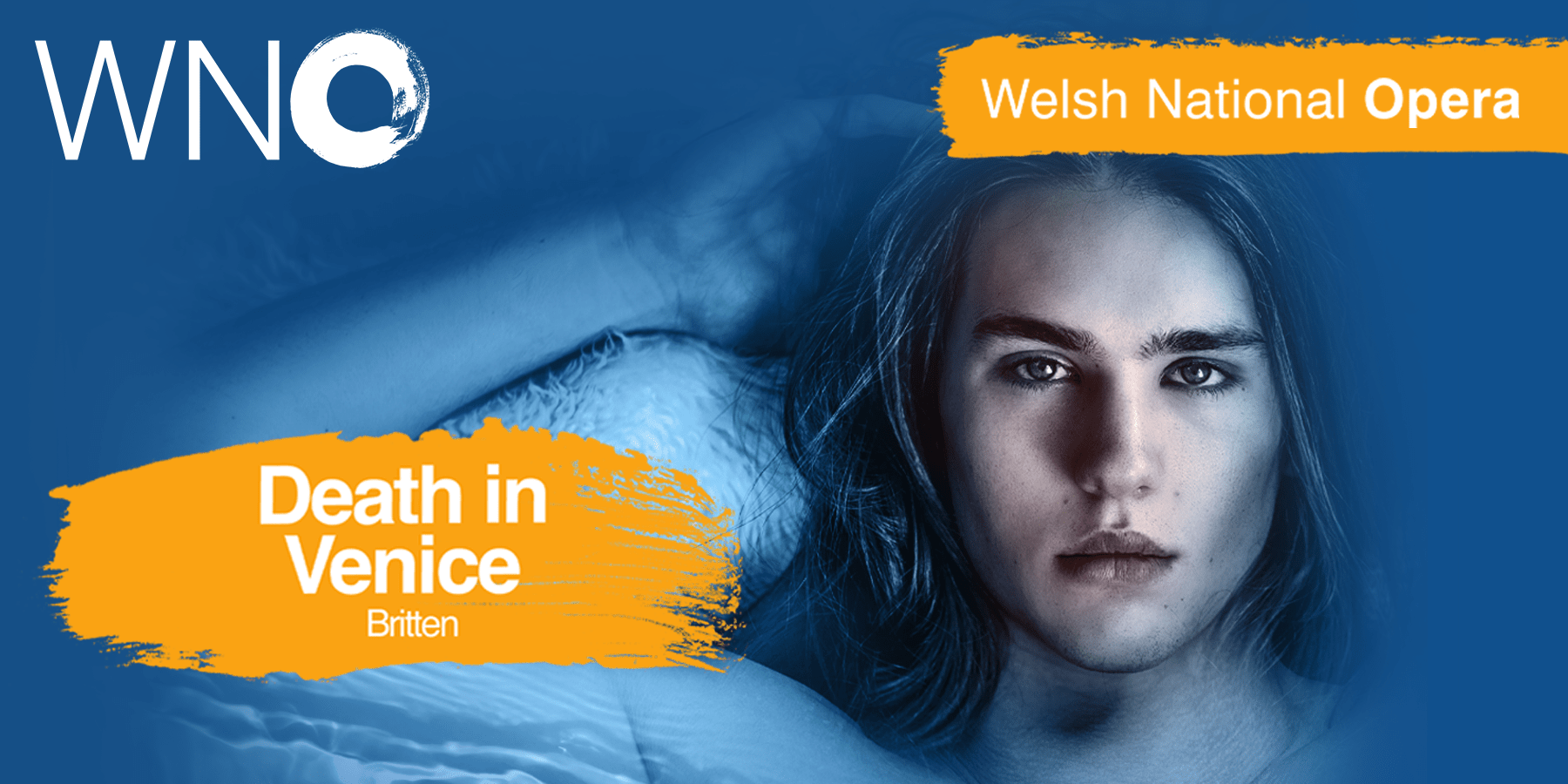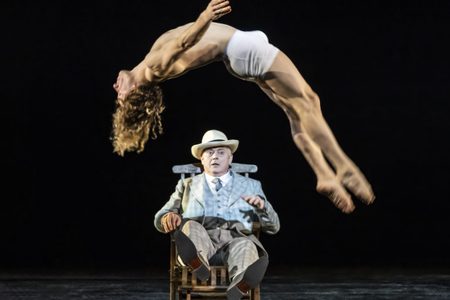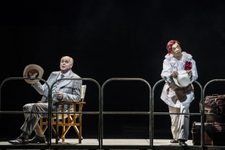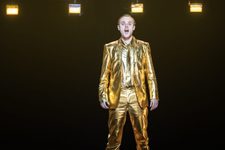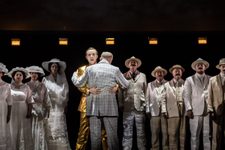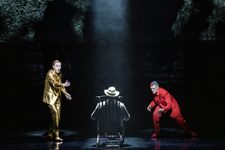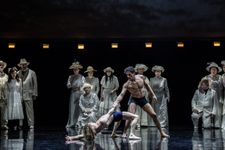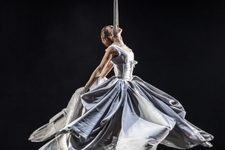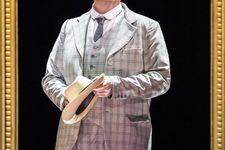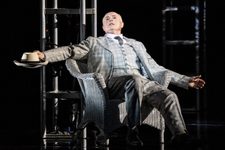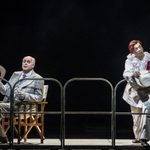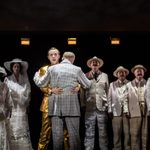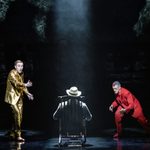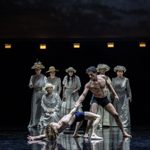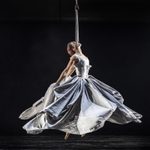In the search for beauty and meaning, the renowned author Gustav von Aschenbach travels to Venice on a whim. In the sultry atmosphere of a cholera epidemic, with the scirocco blowing, he falls in love with Tadzio, a youthful aristocrat who is staying in the same hotel with his family. As Aschenbach projects his loneliness and desire on him, fantasy and imagination intermingle with existence. His obsession progresses to a fever pitch as he becomes increasingly divorced from reality.
Inspired by the original Thomas Mann novella, Britten’s magnificently atmospheric opera comes to life in this new production from WNO, creating images of ravishing beauty, as well as exploring the grotesque hidden beneath the search for the sublime. As poetic worlds of the imagination collide with reality, the early 20th century acts as a mirror to our times.
Sung in English, with English surtitles.
wno.org.uk/venice
#WNOvenice
Price
Prices and discounts subject to changeRunning Time
Approximately 2 hours and 40 minutes including an interval
Performances
CONCESSIONS
WNO Multi-buy package
Book tickets to see Death in Venice and Così fan tutte and save 10% when booking both operas. purchasing tickets at the same time. Tickets must be purchased at the same time and are available on full price tickets in price bands A – C only.
Book tickets to see Death in Venice, Così fan tutte, Ainadamar and La traviata and save 15% when booking 3 operas, or save 20% when booking 4 operas. Tickets must be purchased at the same time and are available on full price tickets in price bands A – C only.
UNDER 16s
£5 tickets when accompanied by a full paying adult, price bands A-D
Offer not available online, please call 0844 338 5000† to book
OVER 65s
£3 off price band A, £4 off price bands B-D
Limited availability
GROUPS
Price bands A – D
8+ tickets – Save £3 per ticket
16+ tickets – Save £4 per ticket
24+ tickets – Save £5 per ticket plus 1 FREE ticket
Call our dedicated Group Sales Team on 0844 338 7000 or
email groupsales@birminghamhippodrome.com for more information and to book now!
CLICK HERE for further information on Group Bookings
EDUCATION ESTABLISHMENTS (Under 18)
Parties of 10 or more pay £17 per ticket plus 1 FREE ticket for teacher/supervising adult for every 10 booked (2 free tickets for SEN bookings), Price bands C-E.
For school bookings, please call Group Sales on 0844 338 7000* for more information and to book now!
UNWAGED, STUDENT, PASSPORT TO LEISURE AND POSTCODE STANDBY
24 hours prior to a performance, best available seats for the lowest price, maximum 2 per booker, subject to availability
CLICK HERE for further information on our Standby Rate and our On the Day Postcode Scheme for Birmingham residents living in B6, B9, B10, B11 and B21
CONCESSIONS FOR PATRONS WITH DISABILITIES
£5 off standard price tickets in all seating areas.
2-for-1 for disabled patrons who require the service/support of a companion.
CLICK HERE for more information on our Access Performances
TERMS AND CONDITIONS
Discounts and Concessions are offered subject to availability at the discretion of the Information and Sales Manager. Top three price bands only, unless otherwise stated. Restrictions may apply. Only one discount per ticket may apply, unless otherwise stated. Offers are non retrospective and cannot be used in conjunction with any other offer. Valid ID must be presented where applicable
The famous writer Gustav von Aschenbach is in his mid-fifties. His wife has died, and his only daughter is married, so he lives alone. He has immersed himself in his work and has received many accolades, but his imagination has dried up and he feels disconnected from the world.
Act I
Outside a cemetery in Munich, Aschenbach sees a mysterious stranger. He is inspired to travel to Venice. On the boat trip to Venice, Aschenbach is surrounded by young people and is repulsed by an elderly fop in full make-up.
On his gondola ride to the hotel on the Lido, he contemplates Venice and its ambiguity and sensuality. His peculiar gondolier only compounds his anxiety.
At his hotel, Aschenbach is welcomed by the manager and shown to his room with a sea view. He contemplates his quest for beauty and how Venice will influence his artistic process. On his way to dinner, he sees an aristocratic Polish youth and is struck by his beauty.
Aschenbach sits reading on the beach. The weather is oppressive, and he wonders if he should stay in Venice. He finds some peace in his calming view of the sea. The Polish youth arrives, and once again, Aschenbach is struck by the perfection of his beauty. He discovers the youth’s name is Tadzio.
Aschenbach takes a gondola in to Venice. He finds it oppressive, stinking and is accosted by beggars and hawkers. He deicides that he must leave and rushes back to the hotel. He briefly glimpses Tadzio. Aschenbach departs the hotel, but his luggage is sent to the wrong train, so he must return. He decides that fate is making him stay and that on seeing Tadzio again made him reluctant to leave.
The next day, watched by Aschenbach, Tadzio and other young people play games. Tadzio wins. Aschenbach feels his creativity returning, inspired by Tadzio. He tries to speak to him, but when the moment comes, Aschenbach cannot speak. He confesses his feelings with ‘I love you’ but only once Tadzio has gone.
Act II
Aschenbach berates himself for his inability to speak to Tadzio. He acknowledges his feelings and gives in to them.
The hotel barber mentions ‘the sickness’ but refuses to explain further to Aschenbach. He goes into the deserted city and sees warning notices. In a German newspaper he reads of rumours of a cholera in Venice. He sees the Polish family, yet rather than warn them, he follows them to St Mark’s. He notices that Tadzio is aware of his gaze, but neither acknowledges the other’s presence. Aschenbach convinces himself that his feelings are honourable.
A group of performers stage a grotesque love story for hotel guests. Neither Aschenbach, nor Tadzio are entertained.
An English clerk is inundated by guests trying to leave Venice. He tells Aschenbach that the cholera and death toll is being hushed up, and that Venetian society is disintegrating, and suggests he should leave.
Although he knows he should warn Tadzio’s mother, Aschenbach cannot bring himself to. He dreams about him and Tadzio being the sole survivors, and the gods Dionysus and Apollo fighting over him.
On the beach Aschenbach watched Tadzio and gives in to his fate. In the hotel, the barber dyes Aschenbach’s hair and covers him in make-up. He continues to follow Tadzio and his family through Venice.
The hotel guests are all departing and Tadzio’s family will leave that afternoon. Aschenbach goes to the beach to watch Tadzio with his friends. The others leave and Tadzio walks out to sea. Tadzio turns and beckons Aschenbach, but he is slumped in his chair – dead.
The Telegraph
The Stage
Bachtrack
